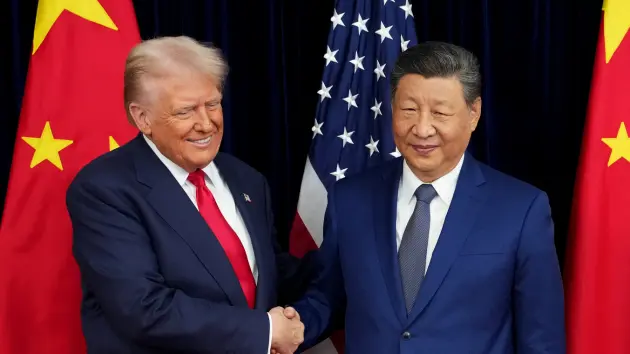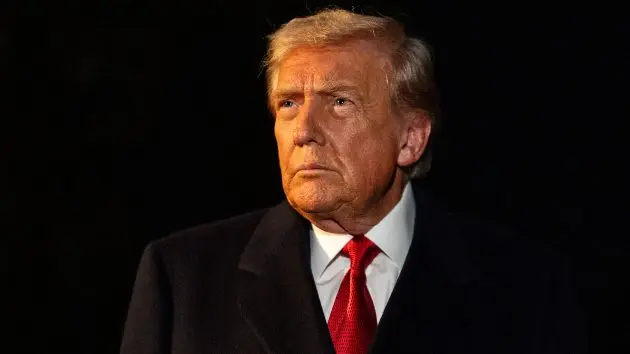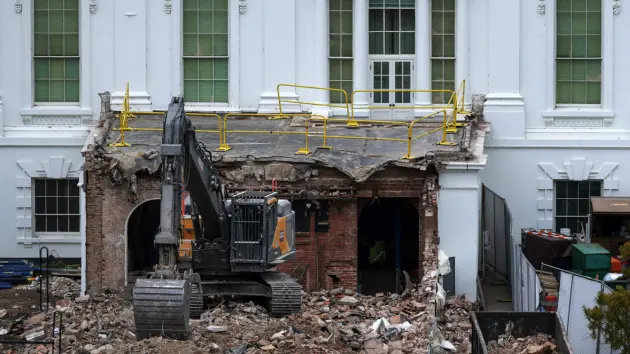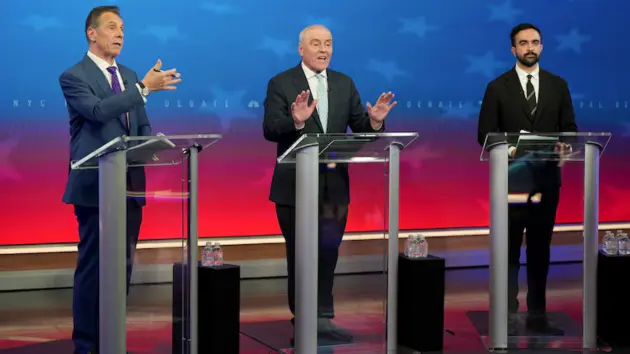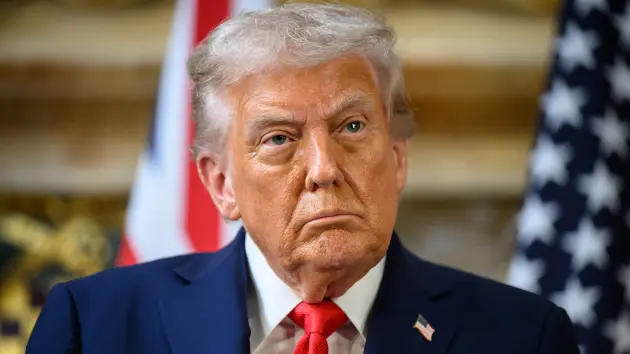(NEW YORK) — President Donald Trump and Chinese President Xi Jinping met for their first face-to-face talks in six years with hopes of ending a monthslong trade war — a meeting that came shortly after Trump said the U.S. would “immediately” begin testing nuclear weapons, which it has not done in more than 30 years.
The meeting at an air base in Busan, South Korea, lasted roughly 1 hour and 45 minutes. Leading up to the meeting, Trump said it could last three to four hours.
The two leaders appeared to be in good spirits leaving the meeting, exchanging a brief word and shaking hands. Trump is now headed back to Washington.
There was no immediate readout of high-profile talks.
The two shared a handshake for the cameras ahead of the meeting and, in brief remarks, projected optimism about the U.S.-China relationship.
“I think we’ve already agreed to a lot of things, and we’ll agree to some more right now, but President Xi is a great leader of a great country, and I think we’re going to have a fantastic relationship for a long period of time,” Trump said.
Xi said, since Trump’s reelection, the two leaders have spoken three times on the phone.
“Given our different national conditions, we do not always see eye-to-eye with each other, and it is normal for the two leading economies of the world to have frictions now and then,” Xi said through an interpreter.
But he said the relationship between the two countries remained “stable on the whole.”
About an hour before the meeting was set to start, Trump posted on his social media platform, touting U.S. nuclear capacity and saying he had ordered the Pentagon to resume nuclear testing on an “equal basis” to other countries’ testing programs, which will begin “immediately.”
The U.S. has “observed a voluntary moratorium on nuclear explosive testing since 1992,” according to the Congressional Research Service, though it has maintained the ability to resume the tests.
“The United States has more Nuclear Weapons than any other country,” Trump said in the post, adding “Russia is second, and China is a distant third, but will be even within 5 years.”
The post went on to say, “Because of other countries testing programs, I have instructed the Department of War to start testing our Nuclear Weapons on an equal basis. That process will begin immediately.”
After negotiations in Malaysia earlier this week, Treasury Secretary Scott Bessent said U.S. and Chinese officials agreed to a framework around trade talks. But ultimately, it’s up to the two leaders to finalize the deal.
Even if truces are made and deadlines extended, experts say any breakthrough will only offer temporary relief: short-term adjustments rather than structural change to one of the world’s most consequential relationships.
What’s on the table in talks
Weeks ago, China announced it would dramatically expand restrictions on rare earth minerals — materials key for producing computer chips that are needed for everything including smartphones, AI systems and defense technology. The new rules mean that foreign firms must get Chinese government approval to export products that have even trace amounts of certain rare earths that originate from China.
Bessent said China has agreed to delay its restrictions by one year. But that’s not a lot of time, certainly not enough build viable alternatives to China.
And experts say restrictions on rare earths are part of Beijing’s long-term plans. While they can delay these controls, it still gives Beijing powerful leverage for years to come.
The rare earth export restrictions are part of a “broader shift in China’s approach to economic diplomacy,” said Neil Thomas, a fellow at the Asia Society Policy Institute’s Center for China Analysis.
“It’s been studying the U.S. export control regime and absorbing the lessons of just how powerful a diplomatic tool can be. … Beijing wants Washington to reduce its own export controls on China,” Thomas said.
Tariffs are also to be a main topic of the talks.
In response to China’s rare earth controls, Trump threatened to impose additional 100% tariffs on China. Bessent says that threat is now off the table.
But Nov. 10 is another deadline: That’s when the 90-day truce on the sky-high tariffs on each country expires. Bessent says he expects an extension, but even with this truce, tariffs on goods from both countries remain in the double digits.
Trump imposed 20% tariffs on China earlier this year over claims that China has failed to crack down on exporting chemicals used to make fentanyl. Trump said he expects to lower those fentanyl tariffs. The flow of fentanyl precursor chemicals has been a longstanding challenge between the U.S. and China.
Bessent said the deal with China also addresses the concerns from American soybean farmers. China has turned to Argentina for soybeans during the trade war, a shift that has deepened financial pressure on U.S. farmers.
Bloomberg and Reuters report that China has purchased a few soybean cargoes — its first purchases from this year’s U.S. harvest. ABC News has reached out to the White House and Treasury Department for comment. While this could be temporary relief, the long-term trend is that China has been steadily reducing its reliance on the U.S.
Plus, the TikTok deal to keep the hugely popular app operating in the United States could be finalized during their meeting. Bessent said on Sunday his “remit was to get the Chinese to agree to approve the transaction” and he believes “we successfully accomplished that” during their negotiations in Malaysia.
The White House announced last month the deal would create a joint venture majority owned by U.S. investors, with Oracle overseeing the algorithm.
Some experts say President Xi is angling for President Trump to signal a shift in U.S. support for Taiwan, the democratically governed island that Beijing claims as its own.
Trump played down the issue, telling reporters he doesn’t know if they’ll even mention Taiwan, which relies on the U.S. for political and military backing.
Also on the foreign policy front, Trump wants Xi to use his sway over Russian President Vladimir Putin to help end the war in Ukraine and to stop buying Russian energy.
Copyright © 2025, ABC Audio. All rights reserved.


